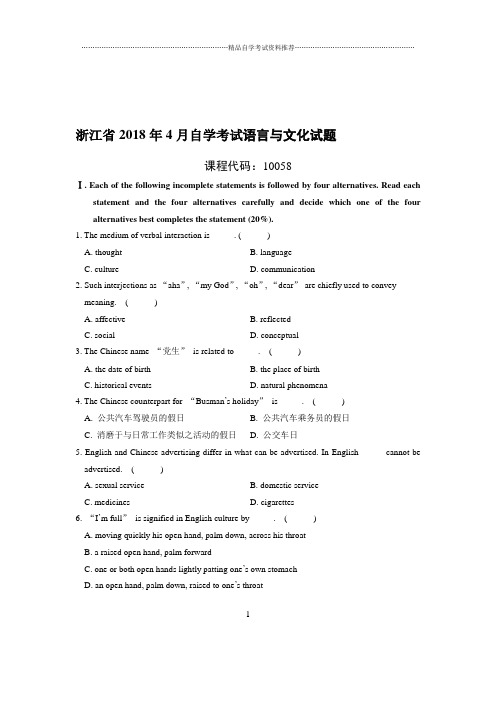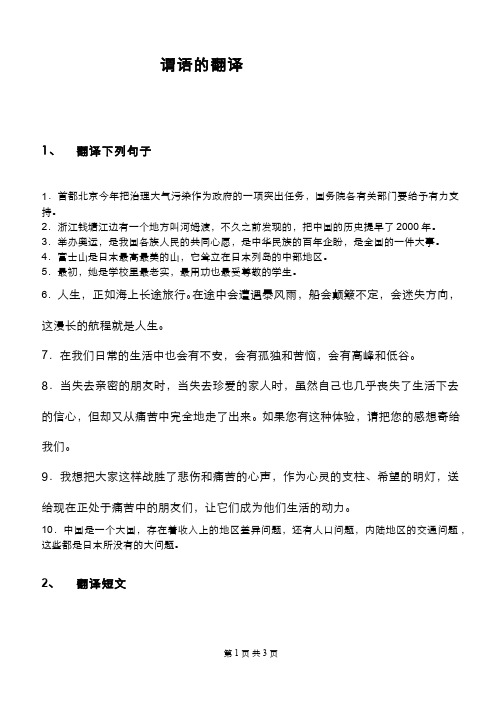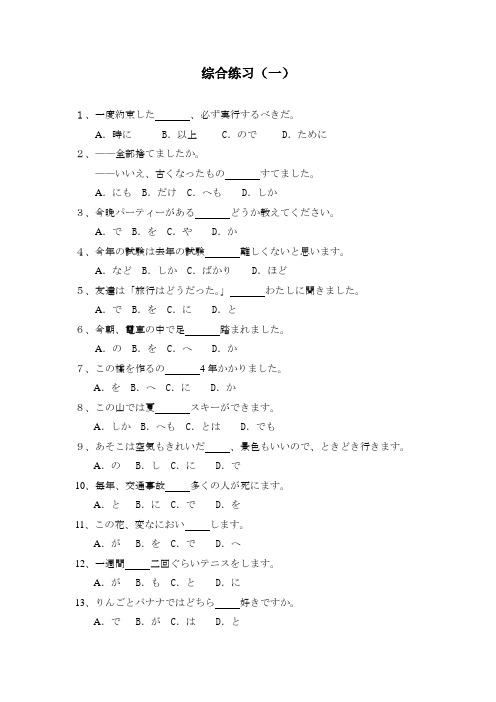浙江省2016年4月高等教育自学考试日语翻译试题
(最新整理)4月浙江自考语言与文化试题及答案解析

浙江省2018年4月自学考试语言与文化试题课程代码:10058Ⅰ. Each of the following incomplete statements is followed by four alternatives. Read each statement and the four alternatives carefully and decide which one of the four alternatives best completes the statement (20%).1. The medium of verbal interaction is _____. ( )A. thoughtB. languageC. cultureD. communication2. Such interjections as “aha”, “my God”, “oh”, “dear”are chiefly used to convey _____ meaning. ( )A. affectiveB. reflectedC. socialD. conceptual3. The Chinese name “党生”is related to _____. ( )A. the date of birthB. the place of birthC. historical eventsD. natural phenomena4. The Chinese counterpart for “Busman’s holiday”is _____. ( )A. 公共汽车驾驶员的假日B. 公共汽车乘务员的假日C. 消磨于与日常工作类似之活动的假日D. 公交车日5. English and Chinese advertising differ in what can be advertised. In English _____ cannot be advertised. ( )A. sexual serviceB. domestic serviceC. medicinesD. cigarettes6. “I’m full”is signified in English culture by _____. ( )A. moving quickly his open hand, palm down, across his throatB. a raised open hand, palm forwardC. one or both open hands lightly patting one’s own stomachD. an open hand, palm down, raised to one’s throat17. Cowboy can represent the _____ aspects of culture. ( )A. geographicalB. politicalC. ChristianD. historical8. When you received a gift from your friend on your birthday, normally your response is _____.( )A. “It’s very beautiful, but I already have one.”B. “You may give it to Jane. She will love it.”C. “It’s so nice, I love it. Thank you.”D. “No, thank you. For it costs you too much.”9. “to kick the bucket”is often associated with _____. ( )A. to get into a temperB. to dieC. to have bad luckD. to go to bed10. “That idea went out of style years ago”illustrates the metaphor that ideas are _____.( ) A. people B. productsC. commoditiesD. fashion11. “Show no surprise or concern about something unusual that happens”is synonymous to _____. ( )A. cast your eye overB. keep an eye out forC. turn a blind eyeD. not to bat an eyelid12. “White room”corresponds to _____. ( )A. 白色的房间B. 病房C. 空房D. 绝尘室13. A Don Quixote represents _____. ( )A. a captivating man known as a great lover or seducer of womenB. an idealistic and impractical personC. a meek person who submits to indignities and sufferings without any thought of act ofrebellingD. a handsome young man, passionate, dashing, who has a way with woman14. “The weather cleared just as the party approached the summit. Until then they had seen2nothing of the panorama around them.”demonstrates _____ relation between the two sentences. ( )A. a temporalB. a causalC. an adversativeD. an additive15. “She drives me out of my mind”is a metaphorical expression about love is _____.( ) A. a physical force B. madnessC. magicD. patient16. It has been claimed that English texts develop _____. ( )A. in a spiral wayB. in a linear fashionC. in a flowery styleD. in a way of much uses of hyperboles17. “A black day”is a day _____. ( )A. when something sad or disastrous happensB. when something remarkable and usually pleasurable happensC. when something should be rememberedD. when there is no moon or sun18. The word in American English for “staff”is _____. ( )A. stuffB. facultyC. teacherD. employee19. _____ relations refer to constructions whose components are linked in meaning through juxtaposition and punctuation/intonation and not through the use of conjunctions. ( ) A. logical B. hypotacticC. paratacticD. hypocritical20. The distance zone ranging from touching to 18 inches is referred to as the _____ zone.( ) A. intimate B. casual-personalC. socio-consultativeD. publicⅡ. Each of the following incomplete statements is followed by four alternatives. Read each statement and the four alternatives carefully and decide which alternative can complete the statement. There might be more than one correct answer. (10%)31. Culture is a _____ phenomenon. ( )A. systematicB. socialC. nationalD. historical2. _____ are facilities where people get served without having to leave their cars. ( )A. Drive insB. MotelsC. HotelsD. Diners3. Possible answers to the question “Have they never invited you home?”could be _____.( ) A. Yes, they have never. B. No, they have never.C. Yes, they have.D. No, they have.4. Michael Stone is a professor, so it is quite common for his students to call him _____.( ) A. Michael B. Professor StoneC. Michael StoneD. Professor Michael5. In English culture “pink”can be associated with _____. ( )A. something bestB. something unpleasantC. womenD. dismal6. Words pejorative in meaning in English but positive or neutral in Chinese are _____.( ) A. propaganda B. dragonC. comradeD. peasant7. V ocatives normally include _____, epithets, etc. ( )A. greetingsB. standard appellativesC. terms for occupationsD. names8. “To throw in the sponge”_____. ( )A. derives from baseballB. means “abandon a struggle or contest”C. derives from boxingD. means “acknowledge defeat”9. When people are introduced to others, they often say to each other, “_____”. ( )A. How are you?B. How do you do?C. How have you been?D. Nice to meet / know you.410. If someone says, “What a big house you’ve got”, the complimented might respond, “_____”.( )A. Thank you. It’s quite big.B. Thank you, I was lucky to be able to get it.C. Thank you, but I think it’s not as big as yours.D. Oh, you really think so?Ⅲ. Each of the following statements has an underlined space. Fill in each underlined space with a proper expression. (24%)1. ___________ is a collection of religious books comprising the Old Testament and New Testament.2. The British English equivalent for “check”is ___________.3. English pronouns are marked for four cases: ___________, objective, genitive determinative and genitive independent.4. “保持一身清白”corresponds to “___________”in English.5. ___________ is a book with the telephone numbers of different shops, restaurants, business, organizations, etc.6. “Homer sometimes nods.”can be translated into “___________”in Chinese.7. In its broad sense culture is the attributes of man, and it is also called “large C culture”or “___________ culture”.8. The English equivalent for “黄道吉日”is ___________.9. Beautician is an euphemism, referring to ___________.10. It is generally accepted that at the sentential level ___________ relations are observed far more frequently in English than in Chinese.11. The Chinese equivalent for “Wester”is ___________.12. Through the study of psychological time, three psychological orientations have emerged: the past, ___________, and future.Ⅳ. Translation (16%)A. Translate the following into Chinese. (8%)1. Niagara Falls2. Rats desert a sinking ship.53. totem4. Excuse me, would you tell me the way to the nearest post-office?B. Translate the following into English. (8%)1. 敬请光临2. 趁热打铁3. 五月结婚,悔恨终身4. 红白事Ⅴ. Define the following terms. (10%)1. language2. the present-oriented society3. similes and metaphors4. taboos5. text structuresⅥ. Discuss the following topics. (20%)1. Are “please”in English and “请”in Chinese used in the same way in communication? If they are not, what differences can you find between them?2. What cross-cultural contrast can you find between English and Chinese when naming their children?6。
日语翻译(2.3.4)--谓语的翻译

谓语的翻译1、翻译下列句子1.首都北京今年把治理大气污染作为政府的一项突出任务,国务院各有关部门要给予有力支持。
2.浙江钱塘江边有一个地方叫河姆渡,不久之前发现的,把中国的历史提早了2000年。
3.举办奥运,是我国各族人民的共同心愿,是中华民族的百年企盼,是全国的一件大事。
4.富士山是日本最高最美的山,它耸立在日本列岛的中部地区。
5.最初,她是学校里最老实,最用功也最受尊敬的学生。
6.人生,正如海上长途旅行。
在途中会遭遇暴风雨,船会颠簸不定,会迷失方向,这漫长的航程就是人生。
7.在我们日常的生活中也会有不安,会有孤独和苦恼,会有高峰和低谷。
8.当失去亲密的朋友时,当失去珍爱的家人时,虽然自己也几乎丧失了生活下去的信心,但却又从痛苦中完全地走了出来。
如果您有这种体验,请把您的感想寄给我们。
9.我想把大家这样战胜了悲伤和痛苦的心声,作为心灵的支柱、希望的明灯,送给现在正处于痛苦中的朋友们,让它们成为他们生活的动力。
10.中国是一个大国,存在着收入上的地区差异问题,还有人口问题,内陆地区的交通问题,这些都是日本所没有的大问题。
2、翻译短文商量日程现在我们商量一下从明天开始的日程安排。
在各位来中国以前,通过信件,传真,和电子邮件,我们已经了解了各位的希望和要求,并且在日程安排上也尽可能地将其反映出来了。
请各位看一下。
日程安排得很紧,很抱歉。
因为我们想借这次访问中国的机会让各位多参观一些地方,多和一些人士进行交流,所以我们安排了这样的一个日程。
参观的地方基本上已经联系好了。
如果各位还有什么希望和要求的话,请尽早向我们提出来。
三、翻译短文“ZEMI”—一种值得借鉴的教育方法我愿向国内介绍一种在日本各大学用的教学方法—“ZEMI”即日语“研究会”的意思。
其主要特点是老师划分一个大致范围,学生在此范围内就自己最感兴趣的一个方面,自由选题,独立研究,写出论文,然后在研究会上以演讲的形式发表,老师和同学们就论文提问质疑,共同探讨,发表者再根据大家的意见对论文修改,补充,提高,最后形成一篇质量教优的论文。
自考《日语教程》课文翻译与练习答案.doc

第一課私は日本人です课文译文我是日本人(一)这是桌子。
那是笔记本。
那是书。
这是什么那是报纸。
那是什么这是词典。
那是什么那是铅笔。
(二)小王,你是中国人吗是的,我是中国人。
田中也是中国人吗不,田中不是中国人,是日本人。
你是日本人吗对,我是日本人。
佐藤也是日本人吗对,是的。
练习答案一、① D② C③ B④ A二、① B② B③ B④ C三、① D② B③ B④ C四、1.これは新聞です。
2.それは辞書ではありません。
3.王さんは中国人です。
4.私は日本人ではありません。
第二課ここは教室です课文译文这里是教室(一)这里是教室。
那里是图书馆。
那里是食堂。
学校的前面是百货商店,对吗不,学校的前面是一家公司。
是什么公司是家电脑公司。
那里以前是百货商店吗不,那里以前不是百货商店。
百货商店在哪里百货商店在学校的后面。
(二)山下:各位,早上好。
我是山下。
请多多关照。
小赵:初次见面。
我是中国人,我姓赵。
是东京大学的留学生。
专业是日语。
请多多关照。
练习答案一、1.C2.D3.A4.B二、1.B2.D3.B4.C三、1.A2.B3.B4.B四、1.①それは田中さんの本です。
② これはわたしの鉛筆です。
③ あれは新聞です。
④ 先生の机はそれです。
⑤ 佐藤さんは日本人です。
2.①いいえ、わたしは田中さんではありません。
② はい、わたしは張です。
③ いいえ、王さんの新聞はそれではありません。
④ はい、あの日本人は留学生です。
3.①いいえ、これはノートではありません。
本です。
② いいえ、このノートは王さんのではありません。
佐藤さんのです。
③ いいえ、わたしは中国人ではありません。
日本人です。
④ いいえ、わたしは田中さんではありません。
山下です。
五、1.この机は山下のです。
2.これは新聞です。
本ではありません。
3.わたしはもと学生でした。
4.デパートは図書館の後ろです。
第三課春は暖かいです课文译文春天暖和(一)春天暖和。
夏天炎热。
2016高考日语试卷

2021年普通高等学校招生全国统一考试日语第一局部:听力〔共2节,总分值30分〕第一节〔共7小题,每题2分,总分值14分〕听下面的7段录音,每段录音后有1道小题,从A,B,三个选项中选出最正确选项,没段录音只播放一遍。
例:男の人はどのぐらい日本語を勉強しましたか。
A6か月 B 9か月 C12か月1.男の人は日本のどこへ旅行に行きましたか。
A東京B大阪C北海道2.女子学生は普通どこでアルバイトをしますか。
AスーパーBコンビニCレストラン3.男の人は何を出してあげましたか。
A料理Bお茶C食事代4.お母さんはなぜごちそうをつくりましたか。
A お父さんの誕生日ですからB 今日はいいとがありましたからC おじいさんが食事に来てくてますから5.2人はどこで会いますか。
Aお店 B 駅の前 C 病院の前6.工場見学の日は男の人ははどうしますか。
A 一人で行動します。
B 直接工場に行きますC みんなと一緒に行動します7.卒業のパーティーどんな形にしましたか。
A郊外でする形B料理屋で祝う形C一緒に料理を作る形〔共8小题,每题2分,总分值16分〕听下面的4段录音,每段录音后有2道小题,从A,B,三个选项中选出最正确选项,没段录音只播放两遍。
8.今日は何曜日ですか。
A金曜日B土曜日C日曜日9.男の人の通勤時間はどのぐらいですか。
A20分B1時間半 C1時間10.男の人は日本のお風呂は初めてですか。
A.初めてです。
B.一回入ったことがあります。
C.何回か入ったことがあります。
11.男の人はお風呂の入り方は知っていますか。
A.しりません。
B.少し知っています。
C.よく知っています。
12.女の人はどこに行きたいですか。
A.本屋B.商店街C.桜スーパー13.女の人はどのように目的地まで行きますか。
A.本屋→商店街→目的地B.地下鉄の駅→本屋→目的地C.商店街→地下鉄の駅→目的地14.どうして多くの人がカードを使いますか。
Aお金を盗む人がいないですからBお金を無駄に使いたくないですからC財布にお金がなくても、買い物ができますから15.男の人はなぜカードを使いませんか。
北语16秋《日语笔译(一)》作业1

一、单选题(共 10 道试题,共 40 分。
)V 1. 「住居を含む生活環境の面」的最佳翻译是?. 包括住所在内的生活环境方面. 生活方面,包括宿舍. 含住所在内的生活环境方面. 生活环境方面标准答案:2. 「集う」的正确读音是?. あつまう. あつまり. つどう. あう标准答案:3. 「お越しいただき」中的「お越し」的意思是?. 来到. 搬家. 迁移. 超越标准答案:4. 「研鑽」的正确读音是?. けんざん. けんさん. けんそん. けんぞん标准答案:5. 「顧みる」的正确读音是?. こころみる. かえりみる. こみる. かえる标准答案:6. 「短くても数年、十年やそこらはざらにかかる」的意思是?. 短的要花费几年,长的要花费十年. 花费几年乃至十几年的时间一点也不稀奇. 最短也要花费十年. 花费的时间几年、十几年都有可能标准答案:7. 「魚介類」的正确读音是?. ぎょうかいるい. ぎょかいるい. ぎょかるい. ぎょうかるい标准答案:8. 「関心をそそられる」的意思是?. 关心. 感兴趣. 勾起关心. 引起关心标准答案:9. 「歓迎」的正确读音是?. かんえい. かんけい. かんげい. がんげい标准答案:10. 「です」的郑重语是?. でございます. でした. であります. である标准答案:二、判断题(共 15 道试题,共 60 分。
)V 1. 「般若心経」的正确读音是はんにゃしんぎょう。
. 错误. 正确标准答案:2. 「ゕマチュゕ」的意思是“専門家”。
. 错误. 正确标准答案:3. 「疲れをとる」的最佳翻译是“去掉疲劳”。
. 错误. 正确标准答案:4. 「哀れみをかける」的意思是“给予悲哀”。
. 错误. 正确标准答案:5. 「新興国」的正确读音是しんこうぐに。
. 错误. 正确标准答案:6. 「末端」的正确读音是まったん。
. 错误. 正确标准答案:7. 「豊富」的正确读音是ほうふく。
. 错误. 正确标准答案:8. 「向上する」的意思是“提高、改善”。
自考英语日语试题及答案

自考英语日语试题及答案一、选择题(每题2分,共20分)1. The book is ________ interesting that I can't put it down.A) soB) suchC) veryD) too答案:A2. ________ the weather is fine, let's go for a picnic.A) BecauseB) SinceC) IfD) Unless答案:B3. He ________ to the meeting this afternoon.A) is going to attendB) will attendC) is attendingD) is to attend答案:D4. She ________ the book for a week.A) has keptB) has borrowedC) has lentD) has taken答案:A5. ________ the teacher came in, the students stopped talking.A) BeforeB) As soon asC) WhileD) After答案:B6. The news ________ he won the prize is true.A) whichB) thatC) whatD) whether答案:B7. He is ________ to go abroad for further education.A) possibleB) likelyC) probableD) impossible答案:B8. ________ the problem, he decided to ask his teacher forhelp.A) Faced withB) FacingC) To faceD) Having faced答案:A9. ________ the heavy rain, the match was put off.A) Because ofB) Owing toC) Due toD) In spite of答案:C10. ________ the book, he went to the library.A) Having finishedB) Having been finishedC) FinishedD) Being finished答案:A二、填空题(每题2分,共20分)1. ________ (如果) you are tired, you can take a break.答案:If2. ________ (尽管) it's raining, we are still going to the park.答案:Although3. ________ (因为) he was late, he missed the train.答案:Because4. ________ (直到) he finished his homework did he go to bed. 答案:Not until5. ________ (只要) you work hard, you will succeed.答案:As long as6. ________ (除非) you are invited, you can't go to the party. 答案:Unless7. ________ (由于) his illness, he couldn't attend the meeting.答案:Due to8. ________ (一旦) you make a promise, you should keep it.答案:Once9. ________ (无论) how hard it is, I will try my best.答案:No matter10. ________ (尽管) she is young, she is very responsible.答案:Even though三、阅读理解(每题2分,共20分)阅读以下短文,然后回答问题。
2016年高考日语试题和参考答案

2016年普通高等学校招生全国统一考试日语试题和评分标准及参考答案本试卷共11页。
满分150 分。
考试用时120 分钟。
考试结束后,将本试卷和答题卡一并交回。
注意事项:1. 答题前,考生务必用0.5 毫米黑色签字笔将自己的姓名、座号、考生号、县区和科类填写到答题卡和试卷规定的位置上。
2. 选择题每小题选出答案后,用2B铅笔把答题卡上对应题目的答案标号涂黑;如需改动,用橡皮擦干净后,再选涂其他答案标号。
写在本试卷上无效。
3. 非选择题必须用0.5 毫米黑色签字笔作答。
答案必须写在答题卡各题目指定区域内相应的位置、不能写在试卷上;如需改动,先划掉原来的答案,然后再写上新的答案;不能使用涂改液、胶带纸、修正带,不按以上要求作答的答案无效。
第一部分:听力(共2节,满分30 分)做题时,先将答案标在试卷上。
录音内容结束后,你将有两分钟的时间将试卷上的答案转填到答题卡上。
第一节(共7小题,每小题2分,满分14 分)听下面的7 段录音,每段录音后有1道小题,从A,B, C 三个选项中选出最佳选项,每段录音只播放一遍。
例:男①人日本語花勉強A. 6力、月B.9 力、月C.12 力、月1. 男①人怎日本旅行尤行吉求L尢力、。
A. 東京B.大阪C.北海道2. 女子学生怎普通乂乙疋了儿八彳卜花L求丁力、。
A. HB. □★二C.以卜沙3. 男O人怎何花出LT^^^L^^oA. 料理B.指茶C.食事代4. 指母作◎求L尢力、。
A. 指父誕生日B. 今日七力•厉◎求L尢力、C. 食事Q来T〈料求丁力5. 2人会求丁力、。
A.指店B.駅①前C.病院①前6. 工場見学①日尤男①人A. 一人疋行動L求ToB. 直接工場尤行吉求TC. 族人肚七一緒広行動L求T7. 卒業丿弋一亍彳一UE^肚形CL求L尢力、。
A.郊外形B.料理屋祝刁形C•一緒料理花作召形第二节(共8小题,每小题2分,满分16 分)听下面的 4 段录音,每段录音后有2道小题,从A,B, C 三个选项中选出最佳选项,每段录音只播放两遍。
日语自考练习题

综合练习(一)1、一度約束した、必ず実行するべきだ。
A.時にB.以上C.のでD.ために2、——全部捨てましたか。
——いいえ、古くなったものすてました。
A.にもB.だけC.へもD.しか3、今晩パーティーがあるどうか教えてください。
A.でB.をC.やD.か4、今年の試験は去年の試験難しくないと思います。
A.などB.しかC.ばかりD.ほど5、友達は「旅行はどうだった。
」わたしに聞きました。
A.でB.をC.にD.と6、今朝、電車の中で足踏まれました。
A.のB.をC.へD.か7、この橋を作るの4年かかりました。
A.をB.へC.にD.か8、この山では夏スキーができます。
A.しかB.へもC.とはD.でも9、あそこは空気もきれいだ、景色もいいので、ときどき行きます。
A.のB.しC.にD.で10、毎年、交通事故多くの人が死にます。
A.とB.にC.でD.を11、この花、変なにおいします。
A.がB.をC.でD.へ12、一週間二回ぐらいテニスをします。
A.がB.もC.とD.に13、りんごとバナナではどちら好きですか。
A.でB.がC.はD.と14、テレビの音聞こえます。
A.をB.にC.がD.で15、兄はわたし映画に連れて行ってくれました。
A.とB.にC.がD.を16、この字はだれが書いたわかりますか。
A.かB.をC.がD.と17、どんなこと聞いてください。
お答えします。
A.でもB.とかC.からD.まで18、今年の夏は、去年の夏暑くありませんでしたね。
A.でもB.しかC.ほどD.ごろ19、このごろは丈夫になったから、何食べてもおいしいです。
A.もB.にC.をD.が20、その花はだれもらいましたか。
A.でB.をC.のD.に21、あしたは9時この教室に来てください。
A.までB.までにC.まではD.までで22、たくさん砂糖を入れた、まだ甘くありません。
A.ばかりB.とかC.からD.のに23、友達に傘を借りた、返すのを忘れていました。
